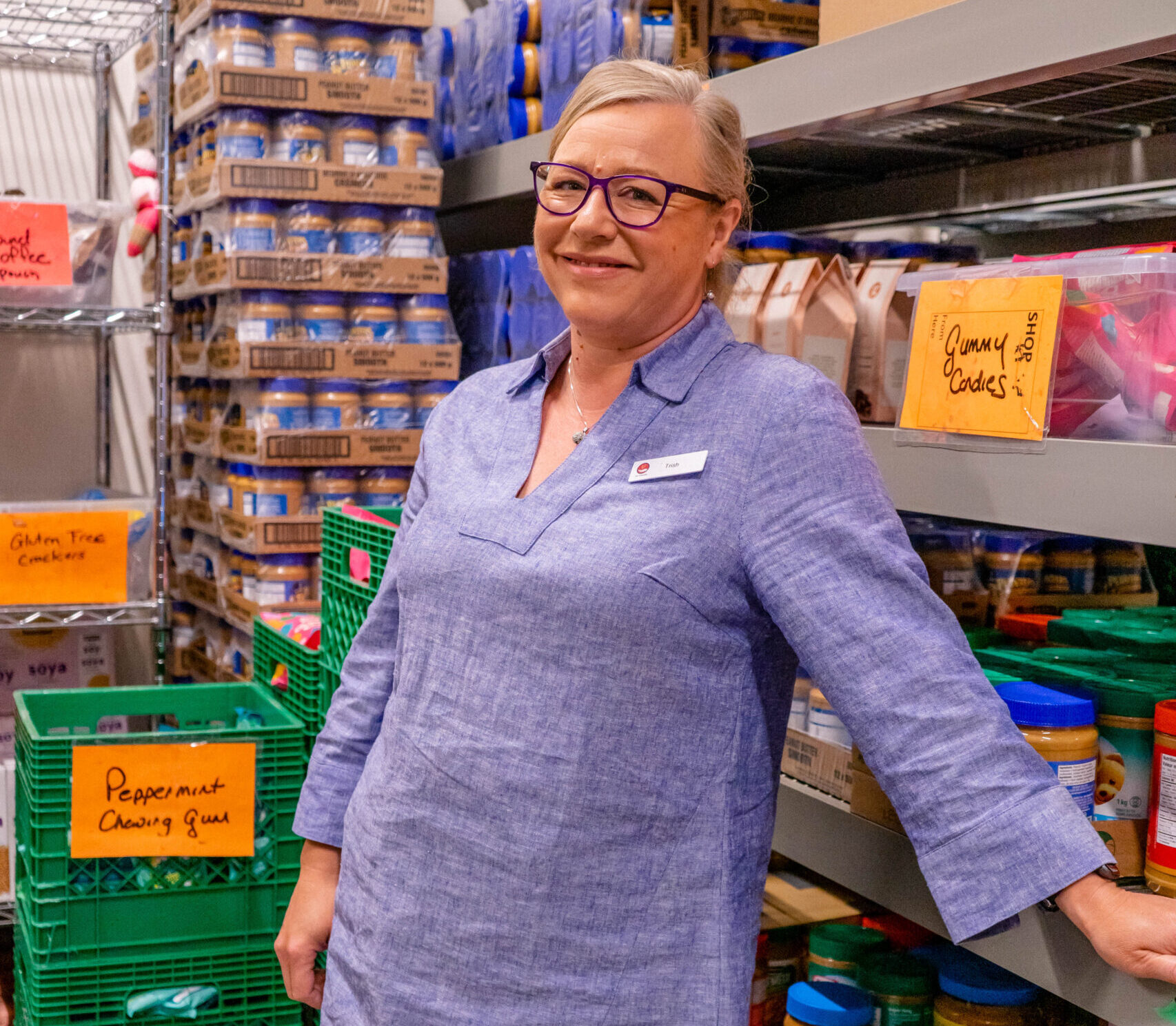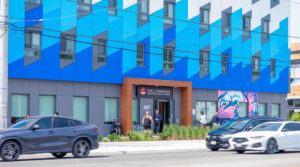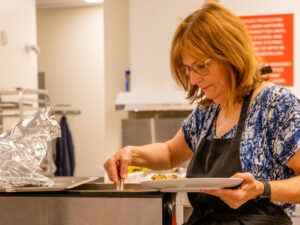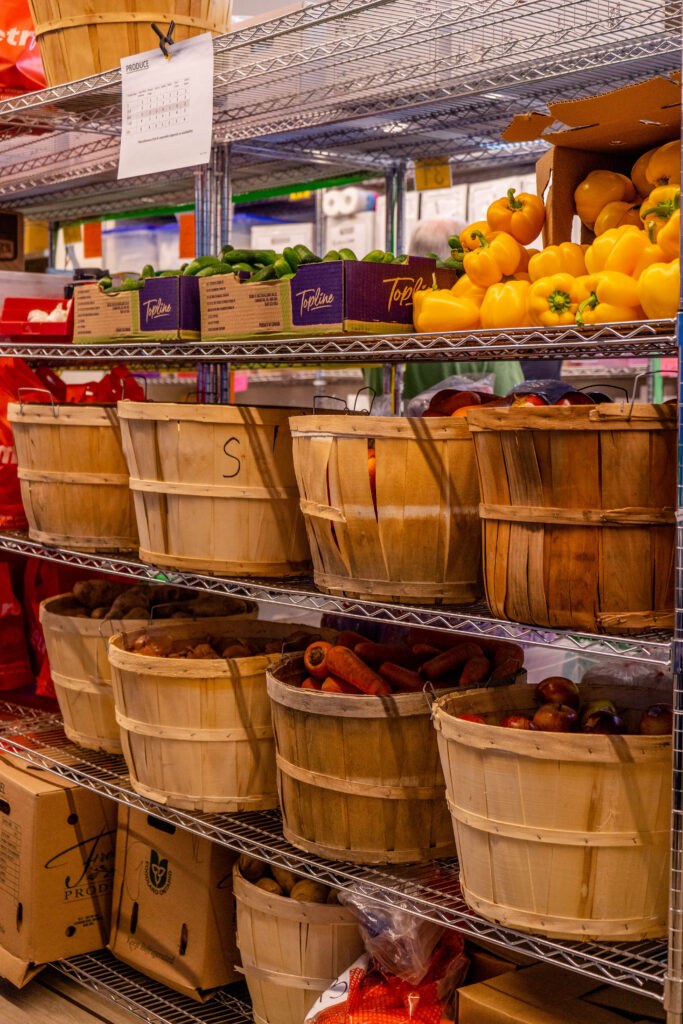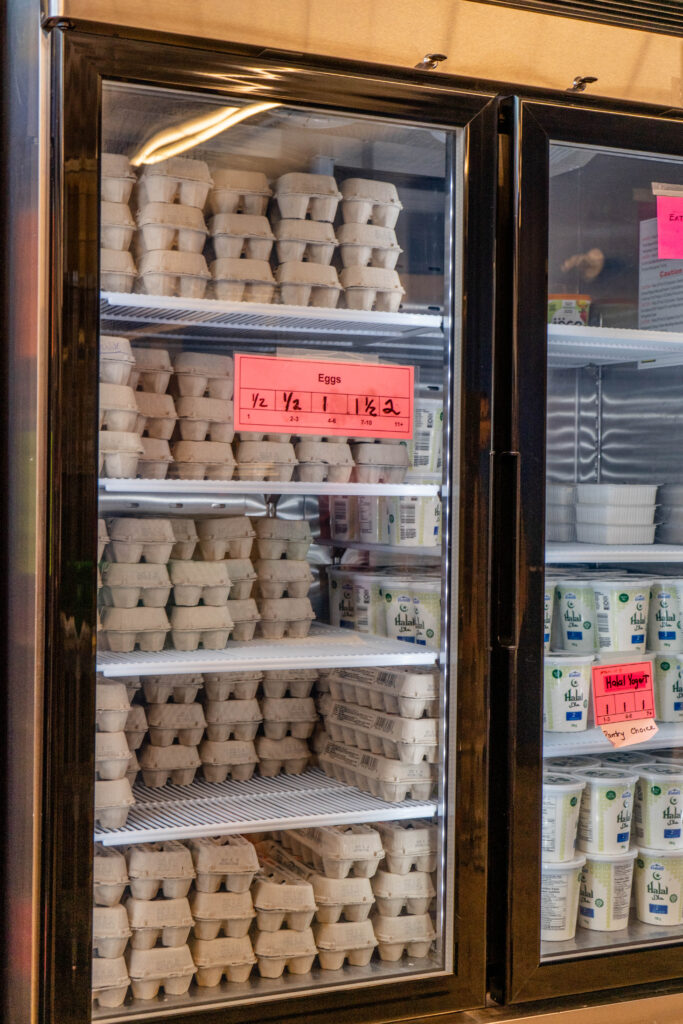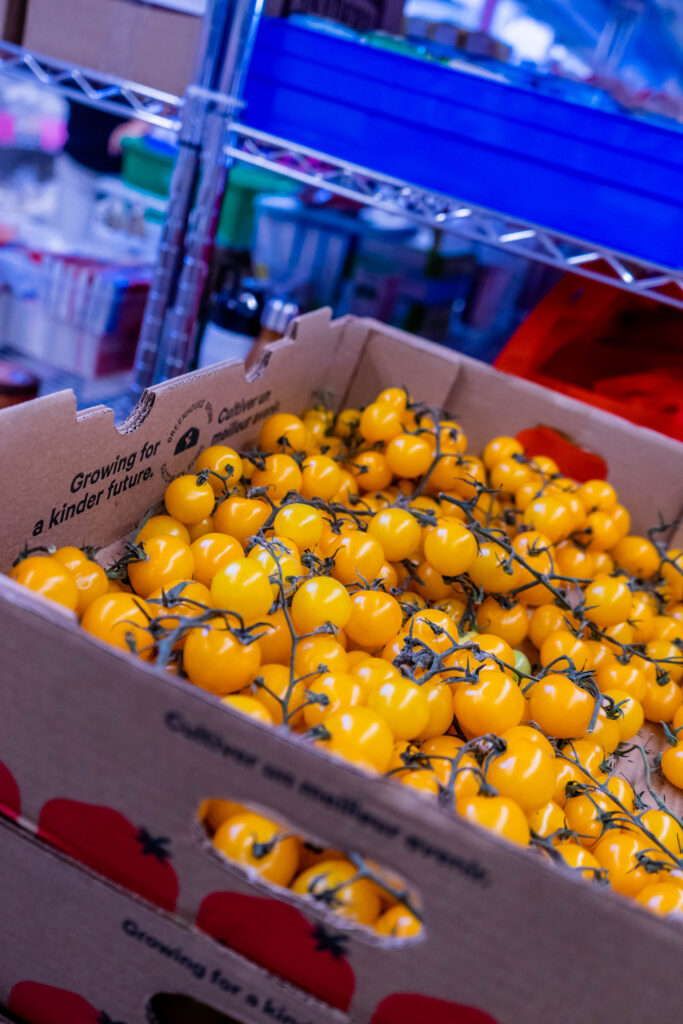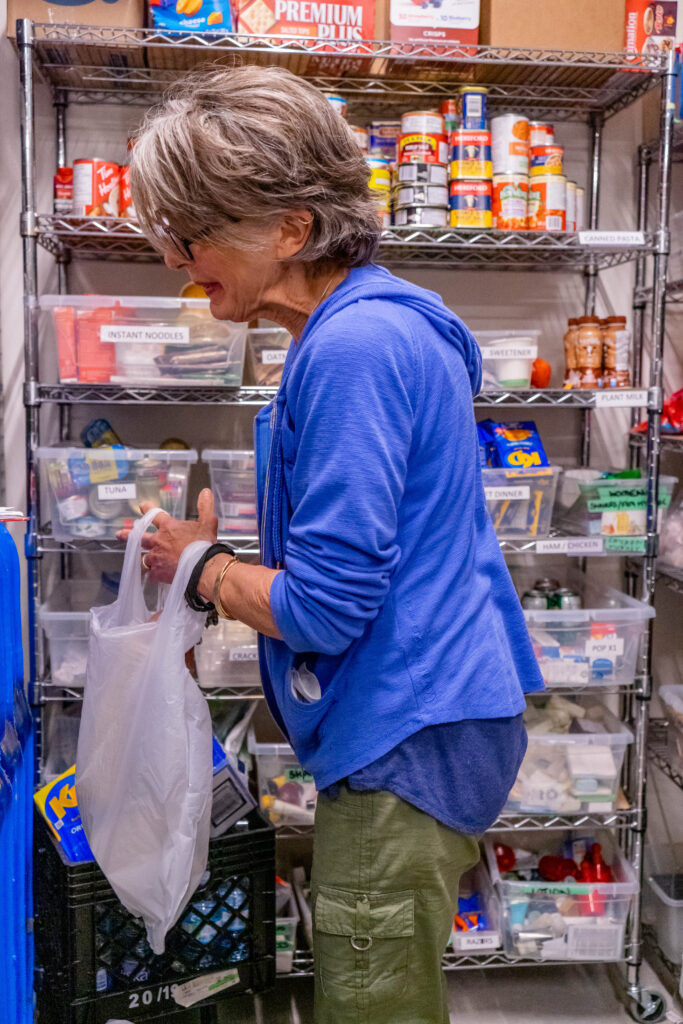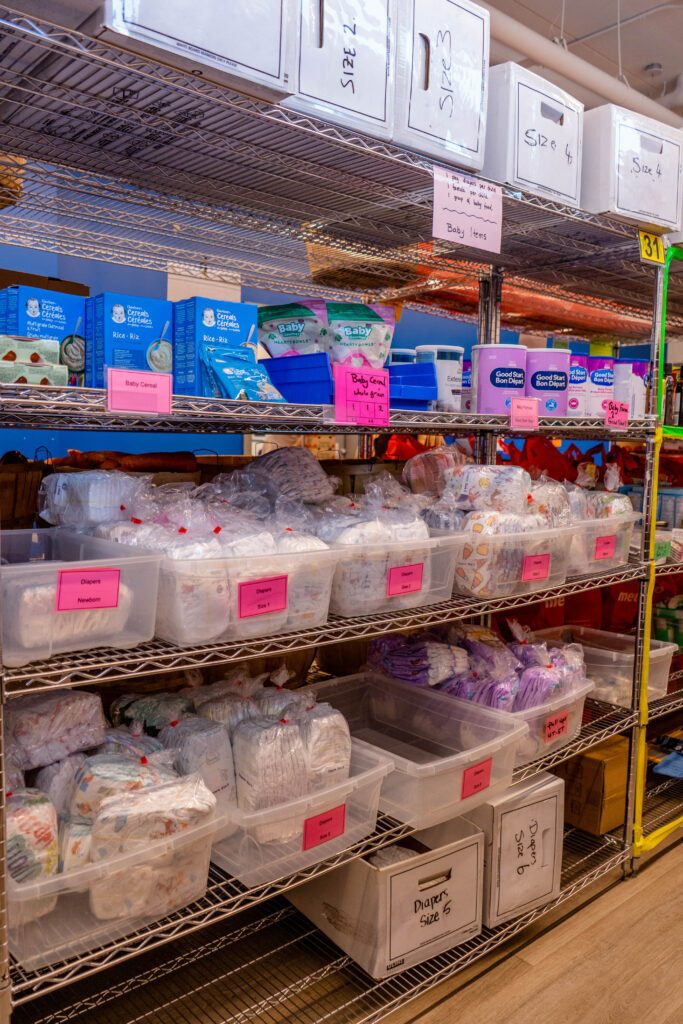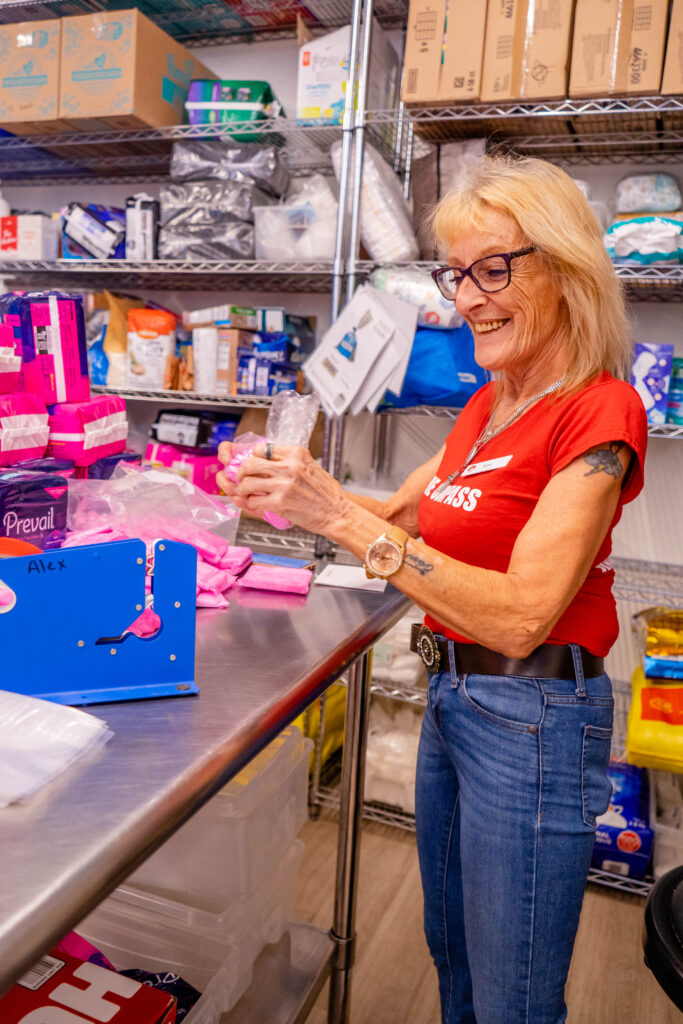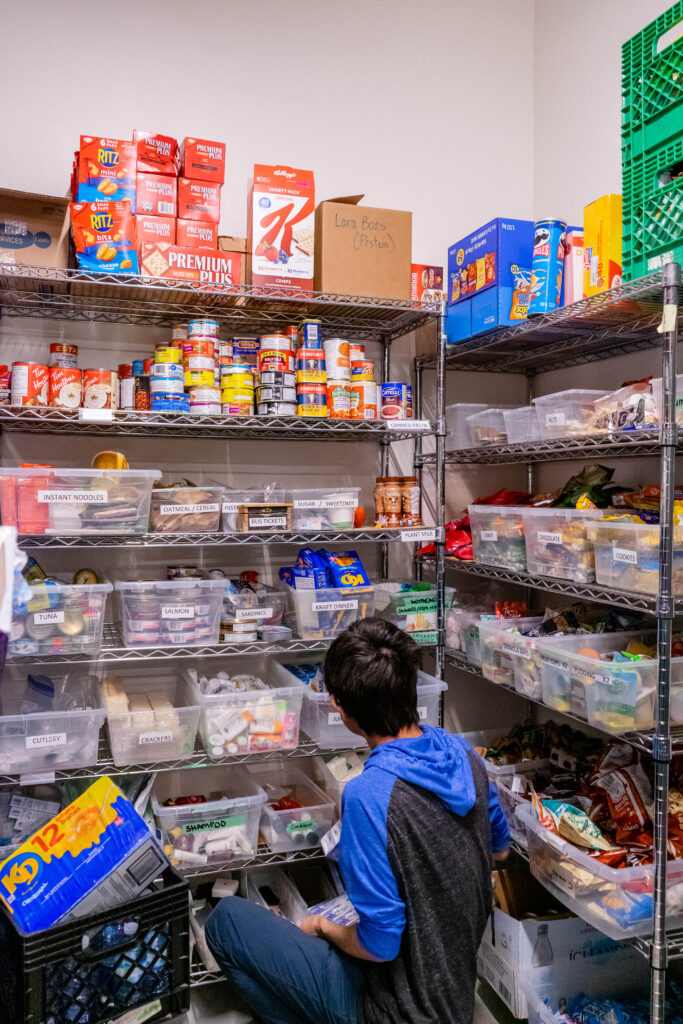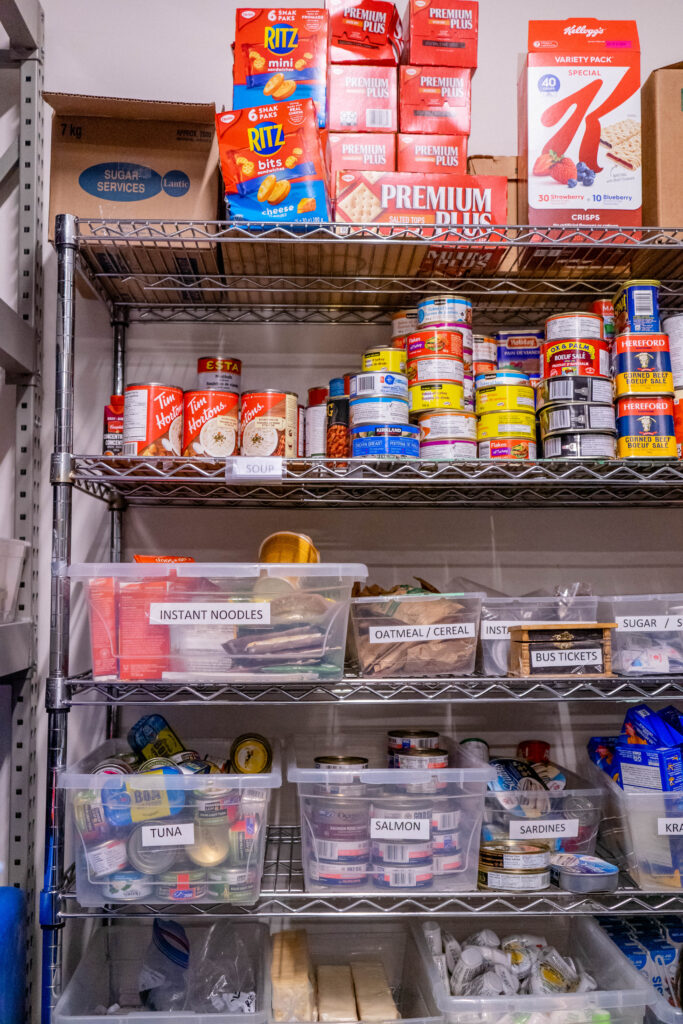Food Banks Mississauga leads a network of over 65 agency members working to realize a food-secure Mississauga. That means when you make a gift, it goes beyond organization! Your support reaches over 60 food support agency members in Mississauga to serve neighbours facing food insecurity across the city.
One of these agency members, located in Port Credit, is The Compass Food Bank & Outreach Centre. They’ve been operating for almost 22 years and have been a member of our agency network for over a decade. Last spring, we had the opportunity to tour their new facility and speak to Trish Trapani, their Market Manager, who has been with The Compass for over 10 years.
As we started our tour of The Compass, Trish filled us in on how they came to be in their new space:
“I’ve been with The Compass for ten years, and almost right when I started, we started to look for our ‘forever home’ because our old location was like… it used to be a sub shop in Port Credit.” As the need grew, The Compass expanded to other buildings on the street. “We were like this Lego house that was kind of pieced together. We were outgrowing as we were growing, and that’s how we ended up here.”
The Compass is now located on the first floor of Lakeshore Lofts – one of Hamilton-based charity Indwell‘s supportive housing initiatives. “It’s really nice because their clients are essentially our clients and vice versa. And we were able to see a lot of our people experiencing homelessness get housed in their units, which is pretty incredible.”
The relationship between Food Banks Mississauga and The Compass focuses on their food bank, which they call their Market. It’s open three days a week: Monday, Wednesday, and Friday. Approximately 50% of the food they distribute is provided by Food Banks Mississauga and delivered to them weekly.
In addition to their food bank, The Compass utilizes its new space to offer a full service kitchen. This is the first stop on our tour.
They offer three or four different meals a day to approximately 250 people. Due to the large quantity of ingredients needed, they must purchase this food instead of relying on donated food bank items.
“We serve meals from the time we open till the time we close. So 7 to 8 hours a day. We want to be sure that when people come in that they get a full meal.”
Trish points down to a hallway with three offices are each side. “We invite agencies in that can help add and offer additional support to our clients.” Today, Wellfort‘s Bloom Clinic is there to meet with clients, offering Hepatitis C testing and education and harm reduction equipment.
Trish continues, “At the far end is a shower, available to whoever would like to use it. Mostly it’s our folks experiencing homelessness that are using the shower. We probably do about 10 to 12 showers a day.”
Next up on the tour is the community room – the common area. It’s filled with tables that are filled with people – chatting and laughing with each other, eating meals from the kitchen, and some waiting to pick up their groceries from the Market.
And that’s our next stop.
“This is the actual food bank. Today, we will serve about 250 households. Just today. When we finish the week, it’ll be 700 to 720.”
Clients can order food in three different ways:
The first is an online ordering system, where folks choose their items online and volunteers will pack their order for them based on their requests.
The second way that The Compass offers is in-person shopping. People can schedule an appointment and shop the Market with a volunteer, which results in a lot of relationship building with the volunteer and the clients.
The third way is their standard hamper, for folks that just drop in. Half of their orders are already prepared with basic pantry items: things like pasta and canned meat. Clients can then choose to add on additional items like fruit and vegetables, milk and eggs, frozen protein, hygiene products, and more.
The Compass gives out 7 to 10 days’ worth of food in a month, so food bank users still need to get the rest of their food at the grocery store. “Consistency is really important because if you’re food insecure, you still have to supplement [with other groceries].” Having a consistent stock of items at their food bank allows clients to make different decisions in the grocery store. Trish gives an example: “So I still need to go to a grocery store. But if I know that I can get milk and eggs and my yogurt at The Compass, then I can make a different decision in the grocery store. Right? It’s not a guessing game.”
Trish leads us to the a different area of the warehouse, where volunteers are repackaging items. “We’re pretty intricate about the packaging and labeling that we use. We want people to feel that they have their dignity, and we do our best to do that, and to make it a no-judgment kind of space and to treat people like we’d treat them at a grocery store.
You know, people come for the food – and it’s really hard to get here the first time, right? There’s a stigma attached to food banks. I wish there wasn’t. There are more and more people using food banks, right? Because people are underemployed. So whether it’s “I’ve got two part time jobs” or our employment rate is great, but everyone’s working part time or they’re underemployed.”
Trish leads us to one last area of the facility a corner by the door. “Our last place is the spot corner here. This is for our clients of no fixed address. Or people experiencing homelessness. Their shopping is a little bit more unique. They need to pick up small amounts of groceries more than once a week because they need to carry it with them. They don’t have to find a place to store under a bench, under a tree. Their canned items need to have the pull top on them.”
“I have found that… the landscape of the world has changed, right? Mental health issues are much more extreme, much higher. Homelessness is growing. Our population experiencing homelessness is up to about 40 right now, which is pretty high. When I first started ten years ago, I think I could count on one hand and even then it wasn’t super visible.”
Trish explains that their decision to bring community agencies that can provide additional support is crucial to caring for the clients they serve.
“Our mandate is to feed people. That’s our very base model. Our job is to feed people. But our focus is more than that – it’s about building relationships and building community. And so, by having people come every week, I get to know you, I get to know your name, we can chat a little bit.
So once people come for the food because they need to feed their family, they start to realize we have these other things that we offer. We connect them to the addictions people. Or help them with housing or help them get better employment.
So it’s about helping the whole person – and if you look at our statistics, around 50% of our people are single. They’ve been isolated for two years, right? When you’re food insecure, you don’t have that five bucks to go for coffee. You start to cut things, and so just to have that human connection again and be able to sit down and have a cup of coffee. You watch these relationships and friendships grow each week, between clients, between volunteers, between volunteers and clients.”
After the tour, we spoke with a client of The Compass who was experiencing homelessness. When we asked him about The Compass, he told us – with great emotion – about how thankful he was for their support.
“I love this place. It’s, you know, it’s amazing. The way the staff and volunteers speak with you – sorry I’m getting a little choked up – It’s amazing. Sometimes you just need somebody to, like, say “hey, you good today? You alright?” You know, it’s like that. Sort of like… a human connection… I can’t tell you how far that goes… because when you’re going through not only, you know, a mental health affliction, but also you’re dealing with, you know, literally – which I never thought it would be – homelessness. This place has been like a blessing. An absolute blessing. They’ve been absolutely stellar human beings with me, they’ve been kind, I have nothing but great things to say about this place.”
Trish finished her tour with this: “We focus on meeting that person at the point of need for that day. You know, there might be a whole thing we need to support you with, you know, you might need housing. You might need addiction support. You might need to look for a job. Well, what do you need today? “Today, I need a cup of coffee and some lunch.” Great. Let’s do that. And so when you start to build these relationships, you build the trust. And there you go. That’s us. In a nutshell.”
Provide food support to your neighbours through our network of 60+ agency members!
Your donations mean we can provide our agency members with more than just food and personal care items, but also support and funding to help them better serve your neighbours facing food insecurity. Donate today!

